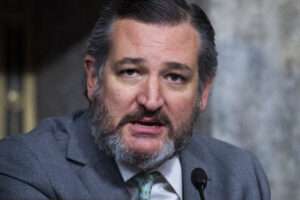Ted Cruz Recycles Election Fraud Claims Already Rejected by the Courts
He and other GOP senators supporting his bid to reject certification of the 2020 election result ignore the fact that courts have already addressed the issues they raise.

Senator Ted Cruz and a group of ten other GOP senators have issued a statement calling on Congress to refuse to certify the 2020 election results unless Congress first creates a commission to investigate President Trump's unsubstantiated allegations of "voter fraud, violations and lax enforcement of election law, and other voting irregularities." The statement claims that the commission is needed because courts have supposedly failed to address these claims: "Ideally, the courts would have heard evidence and resolved these claims of serious election fraud. Twice, the Supreme Court had the opportunity to do so; twice, the Court declined."
It's true that the Supreme Court has declined to hear these claims on the merits, instead dismissing them on procedural grounds. But, as GOP Senator Pat Toomey points out, Cruz and his allies "fail to acknowledge that these allegations have been adjudicated in courtrooms across America and were found to be unsupported by evidence."
Toomey is right. The Trump campaign and its supporters have had numerous opportunities to adjudicate these issues in both state and federal court. And they have repeatedly either failed to present any evidence of fraud or other illegality, or - as in the case of Sidney Powell's "kraken" lawsuits - the "evidence" was so risible that it was quickly laughed out of court.
Consider this ruling by the US Court of Appeals for the Third Circuit, where Trump-appointed Judge Stephanos Bibas wrote an opinion for a unanimous panel emphasizing that "calling an election unfair does not make it so. Charges require specific allegations and then proof. We have neither here." Bibas also noted the Trump campaign's failure to present any evidence or even allegations of fraud, when they had the opportunity to do so. Or consider this more recent ruling, by the Seventh Circuit, in which Judge Michael Scudder, another Trump appointee, reached similar conclusions (again on behalf of a unanimous panel). And there are many more examples of the Trump campaign, the "kraken" lawyers, and other Trump allies filing these types of cases in a variety of courts, and losing on the merits.
Conservative legal commentator Andrew McCarthy - who has supported the Trump administration on many legal issues throughout the president's term - points out that the campaign has repeatedly passed up opportunities to present evidence of voter fraud in court, most likely because they don't actually have any. As he puts it in an article describing a case Trump filed seeking to overturn the results in Wisconsin:
There was no there there. Despite telling the country for weeks that this was the most rigged election in history, the campaign didn't think it was worth calling a single witness. Despite having the opportunity of a hearing before a Trump appointee who was willing to give the campaign ample opportunity to prove its case, the campaign said, "Never mind."
The Cruz statement tries to give the impression that, just because the Supreme Court did not address these issues, that means no court has. That simply isn't true. The Trump campaign has had ample opportunity to litigate its voter fraud and other election claims on the merits. To the extent it failed to do so, it is because they failed to present any evidence of fraud when given the chance.
The overwhelming majority of cases - including the overwhelming majority of election disputes - never reach the Supreme Court. They are instead decided by lower federal courts or by state courts. Election disputes involving state law (like many of the Trump filings) are usually resolved by the latter.
I can understand how someone who knows little about the legal system might assume that only the Supreme Court can adjudicate election claims. But Ted Cruz is a Harvard Law School graduate, and the former solicitor general of Texas. He knows better. Indeed, any US senator should know better.
Either Cruz is remarkably ignorant about the history of the litigation over the 2020 election (and thereby somehow unaware of the many lower court rulings considering Trump's claims) or he's trying to mislead the public. Neither possibility speaks well for him.
There are many other flaws in Cruz's proposal for an investigative commission. But perhaps the most significant is that the courts have already considered the issues it would investigate. And, as Cruz himself admits, the judiciary is in fact the right forum to adjudicate such questions. Once you recognize that the Supreme Court is not the only court in the land capable of adjudicating election disputes, the logic behind Cruz's proposal collapses.
